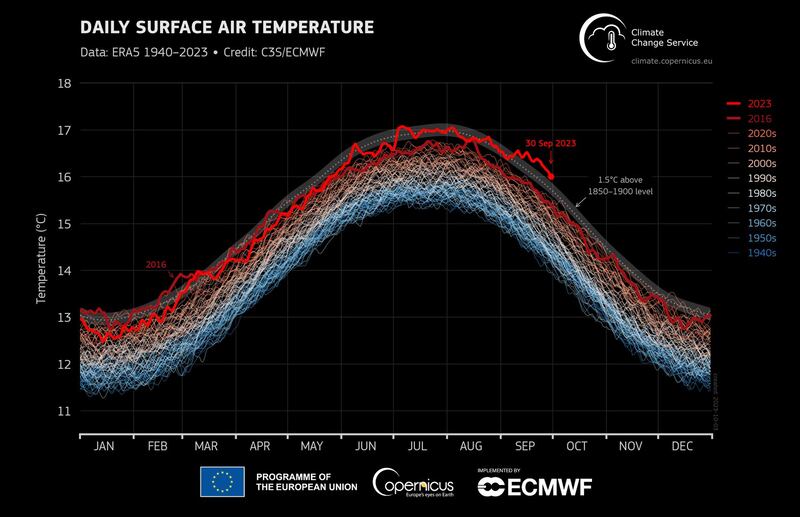Last month was the warmest September on record globally, with an average surface air temperature of 16.38 degrees Celsius (61.48 degrees Fahrenheit) as 2023 continues to be on track to become the hottest year on record, a European climate agency said.
The record temperature was 0.93 C above the 1991-2020 average for September and 0.52 degrees C above the previous warmest September in 2016, the Copernicus Climate Change Service said on Thursday.
Calling it “unprecedented temperature anomalies,” Copernicus said the month as a whole was around 1.75 degree C warmer than the September average for 1850-1900, the pre-industrial reference period.
September “was, in my professional opinion as a climate scientist – absolutely gobsmackingly bananas…” Zeke Hausfather, a researcher with Berkeley Earth, remarked on the social media platform X, formerly Twitter.
Earlier this summer, Asia grappled with unprecedented heatwaves, with record-setting temperatures in China, many Southeast Asian countries and other parts of the region, as the world entered what U.N. Secretary-General António Guterres called a period of “global boiling.”
The World Weather Attribution (WWA), a group of global scientists, said that the heat wave in Southeast Asia in April was expected “once in 200 years,” that would have been nearly unthinkable without the influence of human-induced climate change.
Scientists say the rising temperature is due to carbon dioxide emissions from burning fossil fuels and the emergence of El Niño, a climate phenomenon characterized by the periodic warming of the equatorial Pacific.
“The unprecedented temperatures for the time of year observed in September – following a record summer – have broken records by an extraordinary amount,” said Samantha Burgess, deputy director of Copernicus.
“This extreme month has pushed 2023 into the dubious honour of first place – on track to be the warmest year and around 1.4 degree C above preindustrial average temperatures.”
That would bring the planet closer than ever to the alarming threshold of average temperatures exceeding a 1.5-degree increase from preindustrial times.
“Two months out from COP28 – the urgency for ambitious climate action has never been more critical,” Burgess added.
Global leaders are gearing up for a meeting in Dubai later this year to discuss the world’s progress in reducing carbon emissions.
Many vulnerable Asia-Pacific countries advocate for aggressive climate action and set timelines. However, oil and coal-dependent countries like China, Russia, Saudi Arabia, and India are against such specific targets and fossil fuel phaseouts.

According to Copernicus, the temperature worldwide from January to September 2023 exceeded the average by 0.52 C and was 0.05 C above the same timeframe in 2016, the warmest year on record.
Last August was the warmest August globally and hotter than all other months except July 2023, when it broke the record with the global average temperature at 16.95 C (62.51 F).
The daily average global mean surface air temperature reached 17.08 C (62.74 F) on July 6, surpassing the record set in August 2016, making it the hottest day, with July 5 and 7 shortly behind.
Copernicus said the average sea surface temperature over 60°S–60°N reached 20.92 C, marking it as the warmest September and second-highest monthly temperature ever recorded after August 2023, when it reached nearly 21 C (69.8 F).
Edited by Mike Firn and Taejun Kang.
